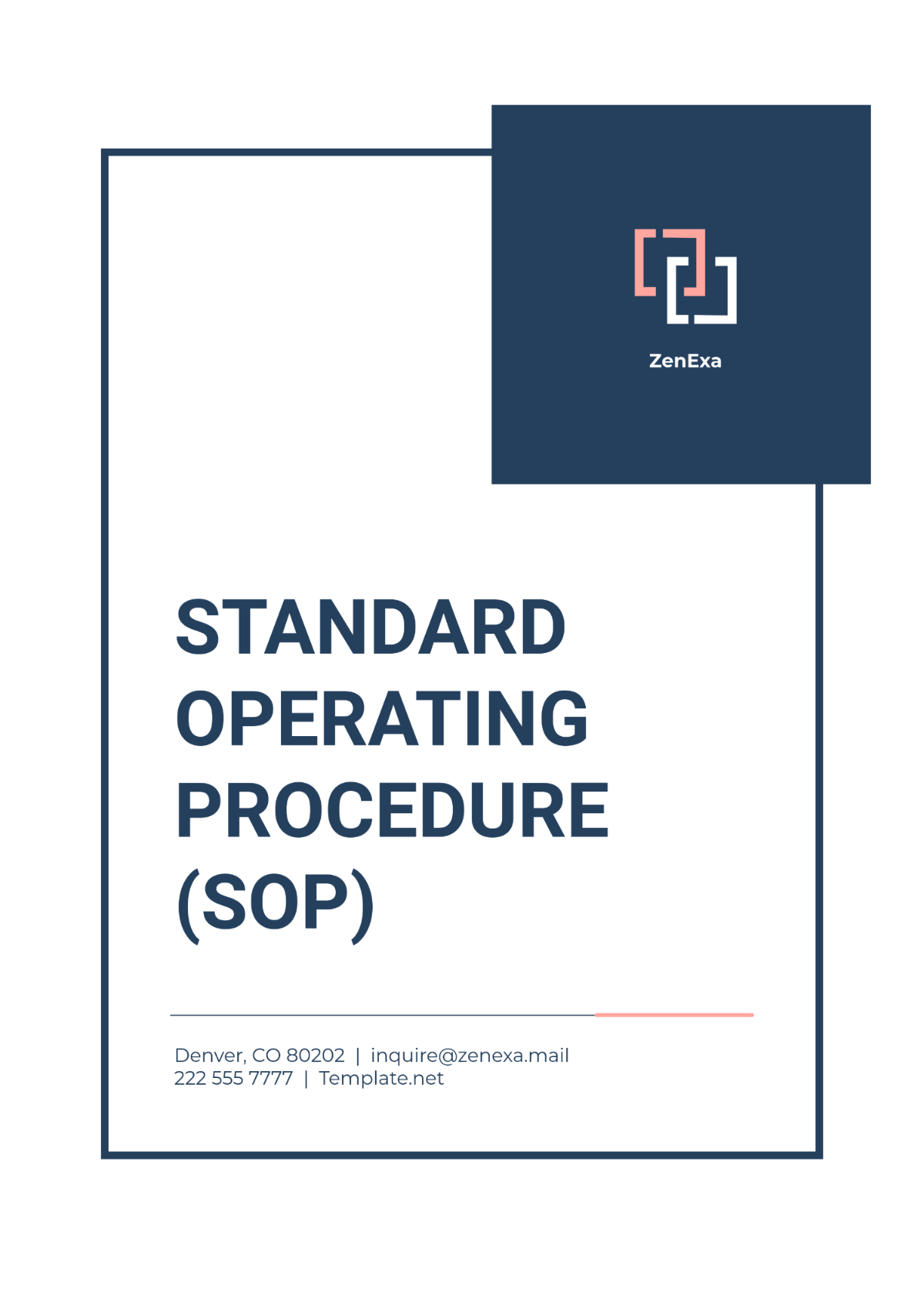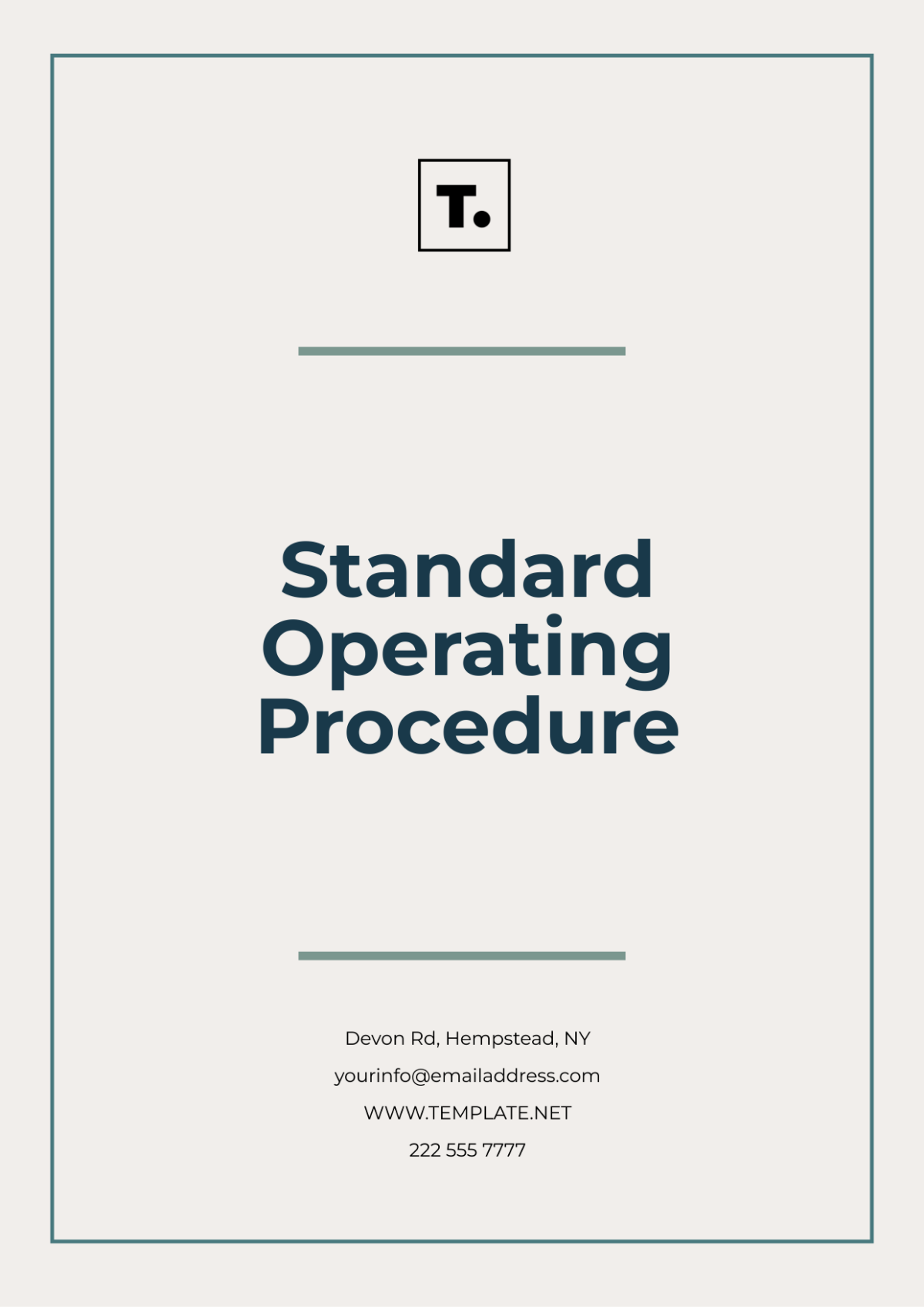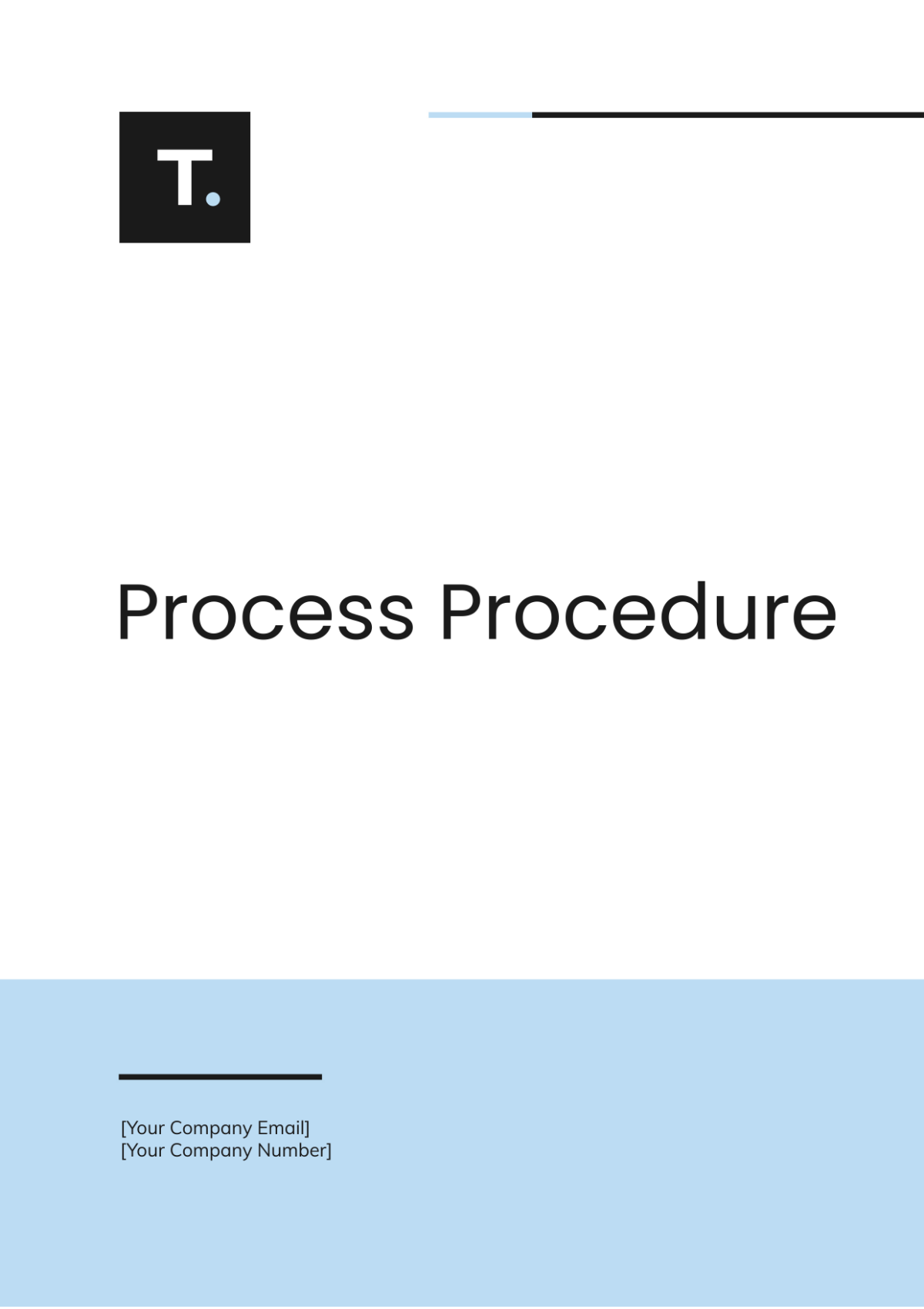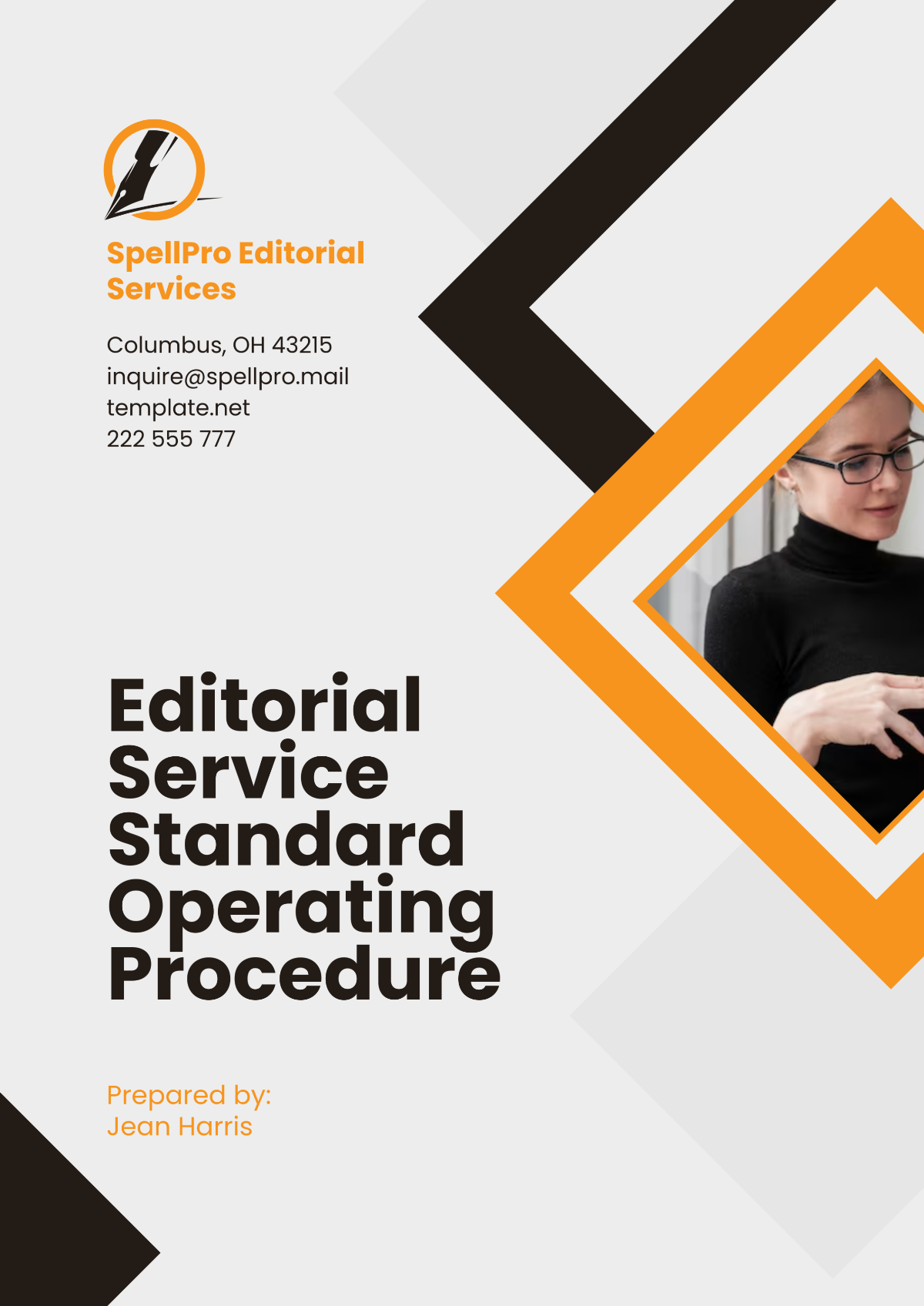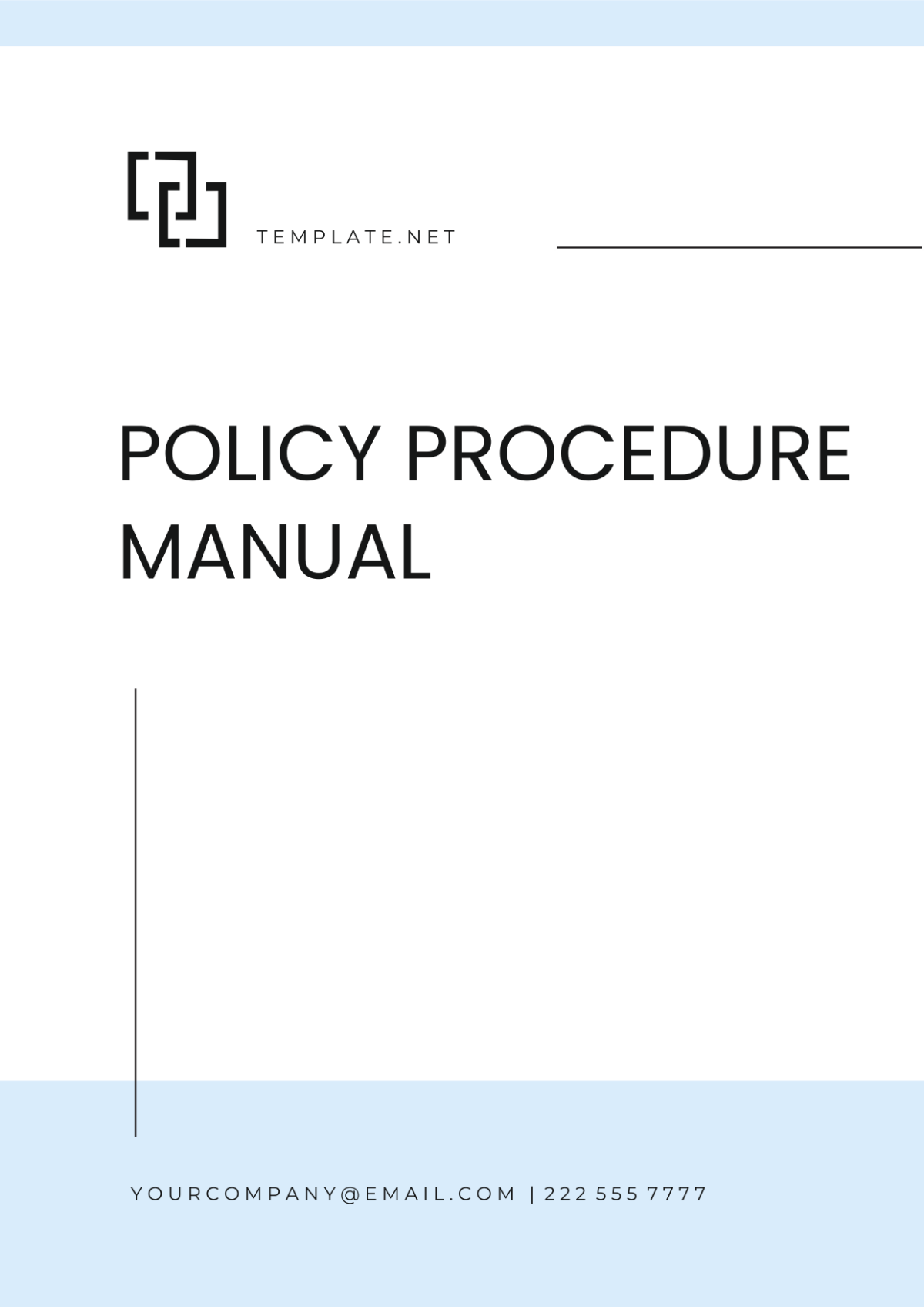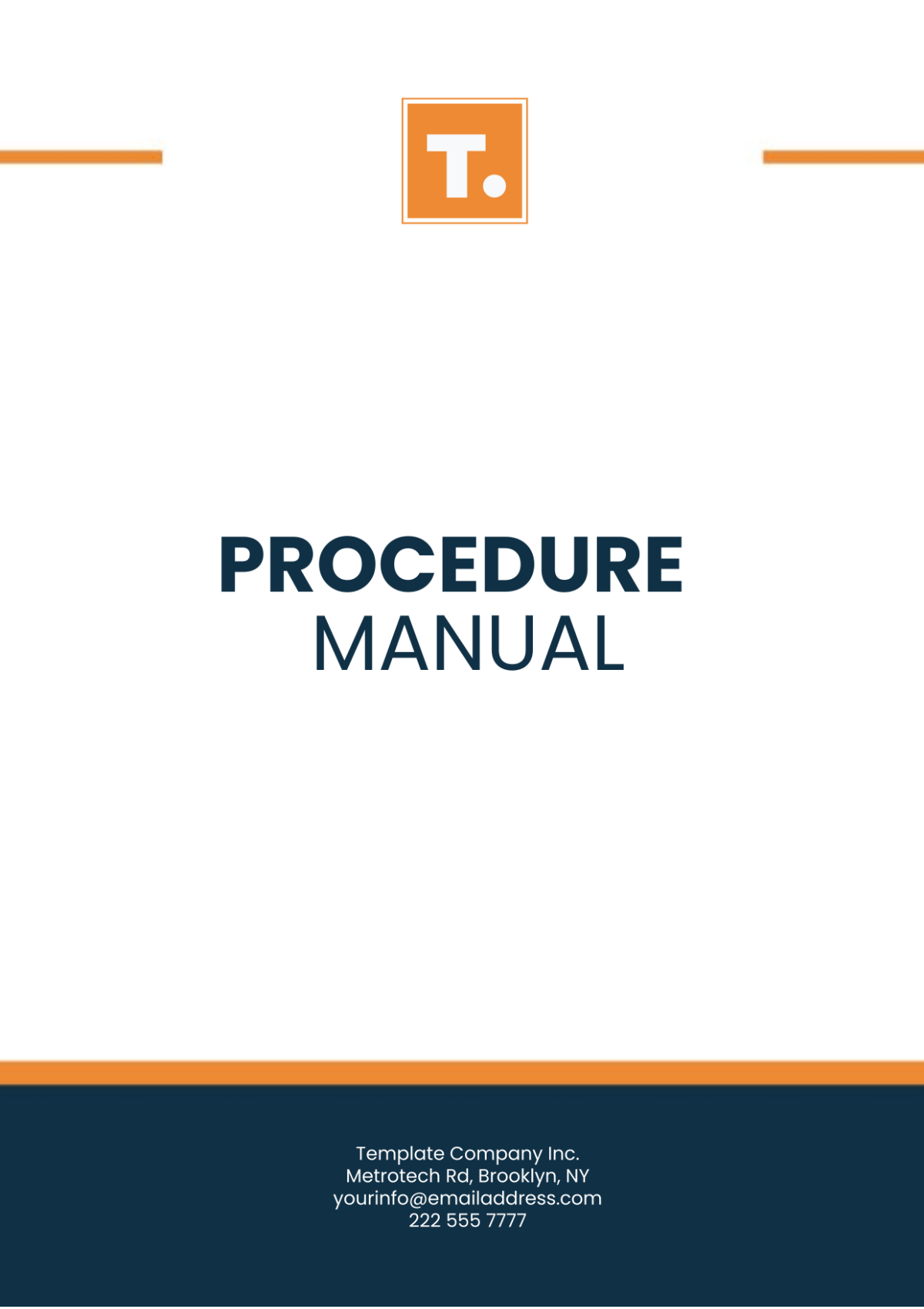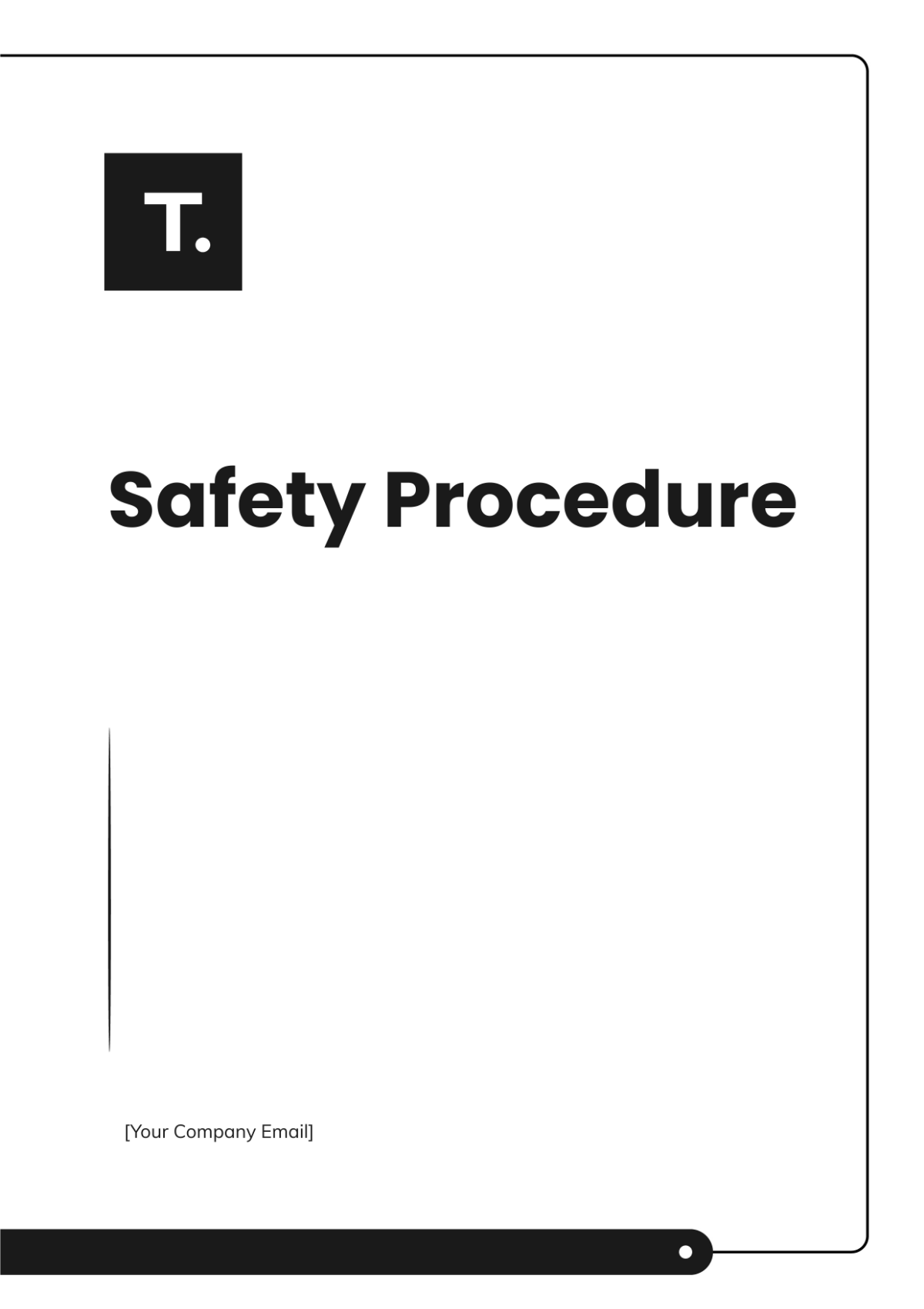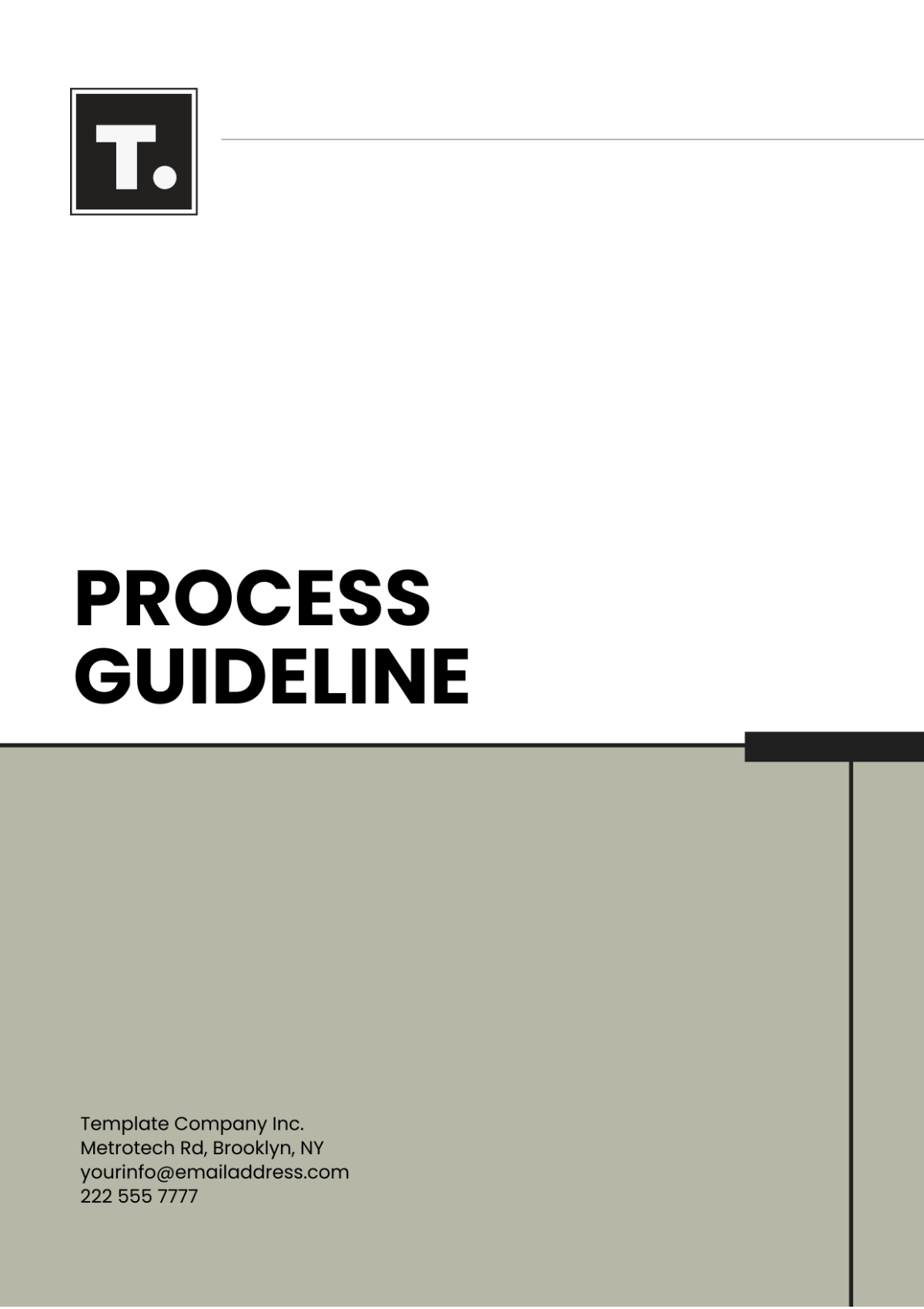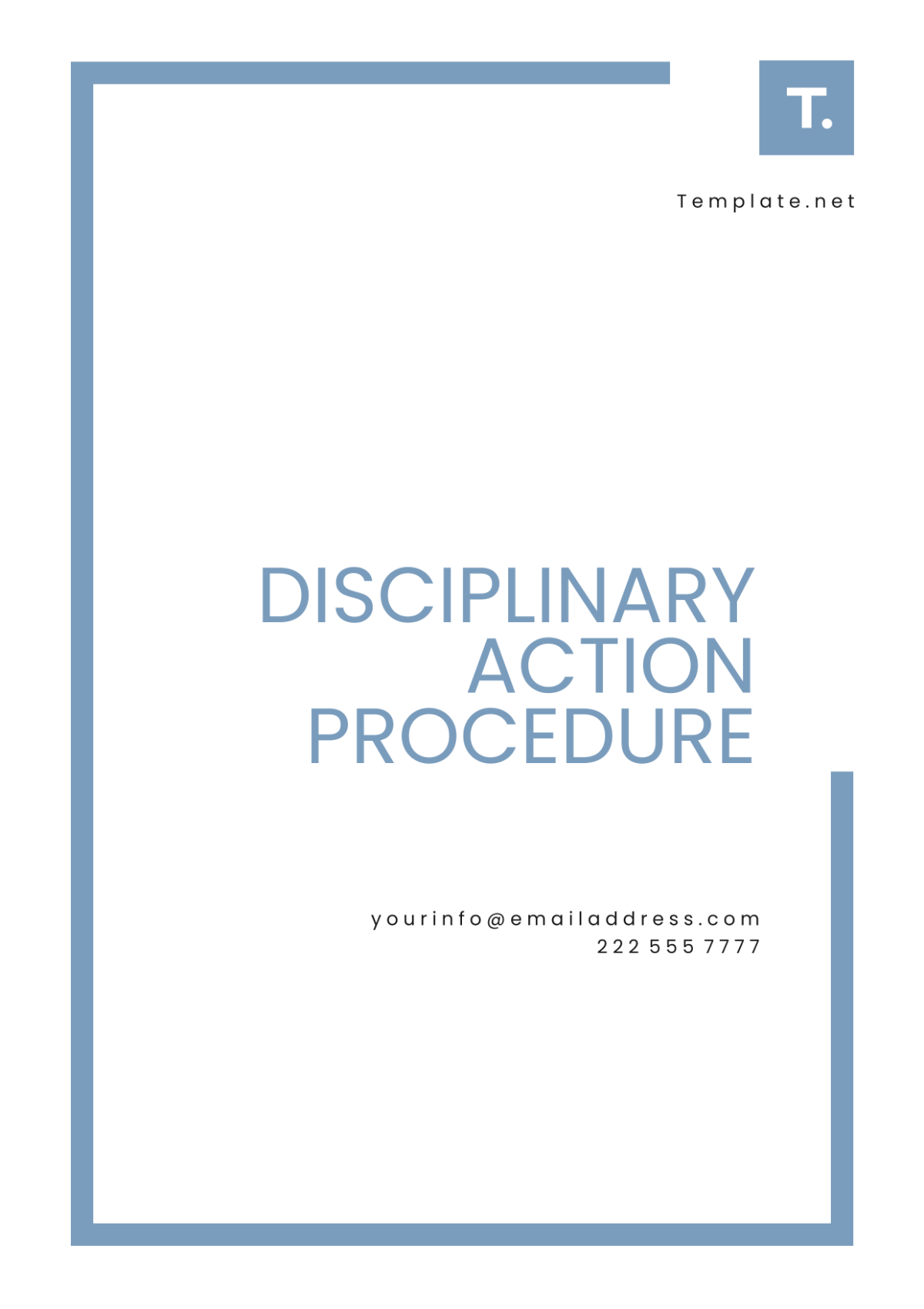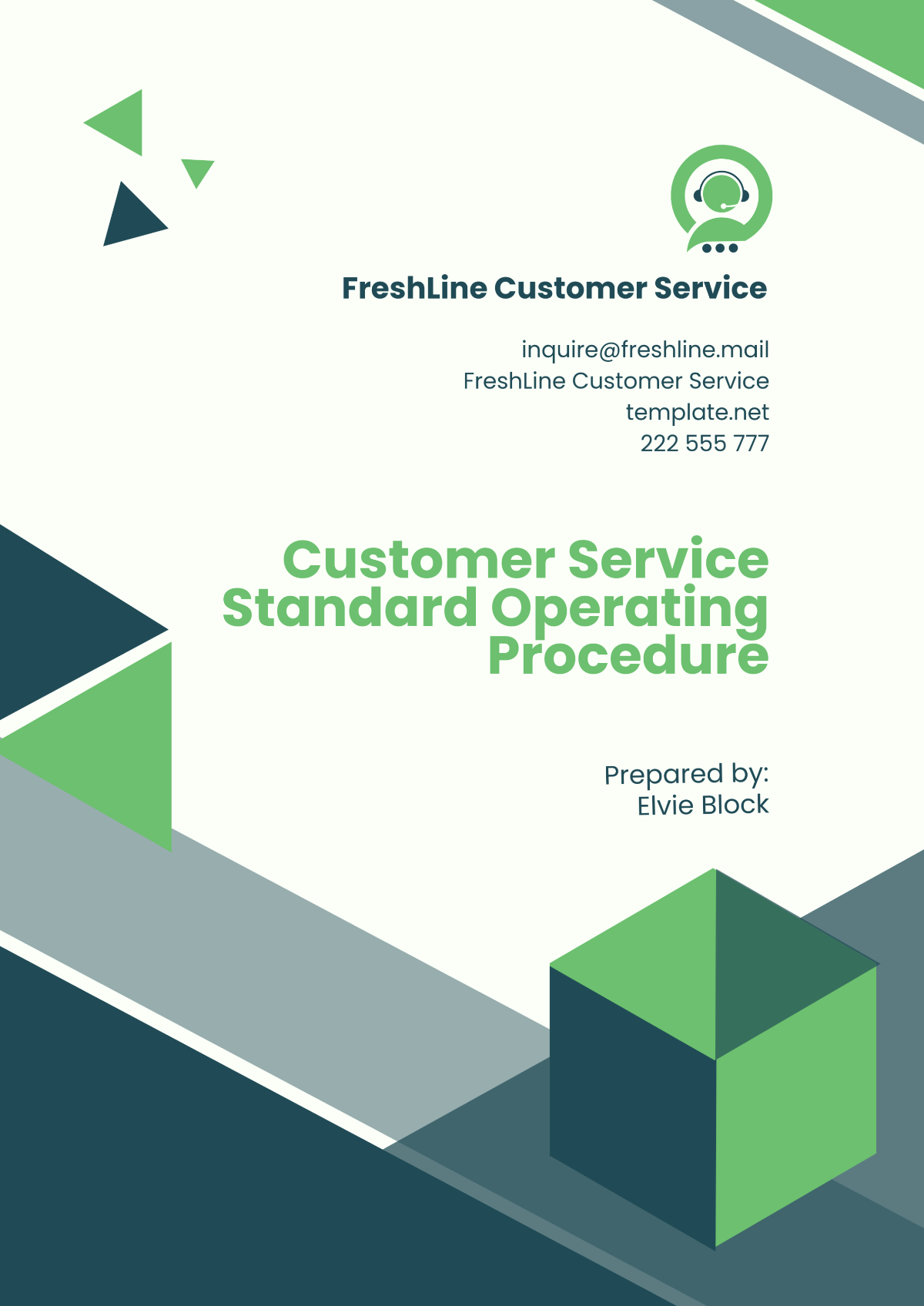Agriculture Sales Standard Operating Procedure
I. Introduction
A. Purpose
The purpose of this Agriculture Sales Standard Operating Procedure (SOP) is crucial to ensure that [Your Company Name] operates with a structured approach to sales within the agriculture sector. By establishing clear guidelines, this SOP aims to streamline processes, enhance efficiency, and optimize sales performance. It serves as a reference for all sales personnel, guiding them through the entire sales cycle from lead generation to post-sale follow-up. This document not only standardizes procedures but also reinforces [Your Company Name]'s commitment to delivering exceptional products and services to our agricultural clients.
B. Scope
This SOP applies to all sales activities conducted by [Your Company Name] within its agriculture division. It encompasses procedures for interacting with potential leads, presenting products, negotiating terms, and maintaining customer relationships. It covers both direct sales to farmers and indirect sales through distributors and agricultural retailers. The procedures outlined here are designed to be adaptable yet standardized, ensuring consistency across all sales operations and personnel. By defining the scope clearly, all team members understand their roles and responsibilities, facilitating smoother collaboration and achieving sales objectives effectively.
C. Definitions
Lead: A potential customer who has expressed interest in [Your Company Name]'s agricultural products, either through direct contact or interaction with marketing efforts.
Customer: An individual farmer, agricultural cooperative, or agricultural business entity that purchases products from [Your Company Name].
CRM: Customer Relationship Management software used to manage interactions with current and potential customers, track sales activities, and analyze customer data to improve sales strategies and customer service.
II. Roles and Responsibilities
A. Sales Manager
Oversee the Sales Team: The Sales Manager plays a pivotal role in overseeing the day-to-day operations of the sales team. They are responsible for setting sales targets, developing strategies to achieve them, and monitoring progress. Regular team meetings and performance reviews are conducted by the Sales Manager to ensure alignment with organizational goals.
Develop Sales Strategies: It is the duty of the Sales Manager to develop comprehensive sales strategies tailored to the agriculture sector. These strategies may include market segmentation, product positioning, pricing strategies, and promotional activities aimed at maximizing sales volume and profitability.
Conduct Performance Reviews: Performance reviews are crucial for assessing individual sales performance and identifying areas for improvement. The Sales Manager provides constructive feedback, sets new goals, and supports professional development initiatives to enhance the skills and capabilities of the sales team.
Provide Training and Support: The Sales Manager ensures that sales representatives are adequately trained on product knowledge, sales techniques, and customer relationship management. They also provide ongoing support and guidance to address challenges and opportunities in the agricultural market landscape.
B. Sales Representatives
Generate and Follow Up on Leads: Sales Representatives are responsible for proactively generating leads through various channels such as cold calling, networking events, trade shows, and digital marketing campaigns. They follow up on leads promptly to nurture relationships and move prospects through the sales funnel.
Conduct Sales Presentations: Sales Representatives conduct engaging and informative sales presentations to demonstrate the benefits and features of [Your Company Name]'s agricultural products. These presentations are tailored to address the specific needs and challenges of each customer, showcasing how the products can solve their problems and enhance their agricultural operations.
Maintain Accurate Records: Detailed record-keeping is essential for tracking customer interactions, sales activities, and progress towards sales targets. Sales Representatives update the CRM system regularly with notes from meetings, follow-up actions, and customer feedback to ensure transparency and collaboration within the sales team.
Achieve Individual Sales Targets: Each Sales Representative is accountable for achieving their assigned sales targets. They develop strategic plans, prioritize opportunities, and negotiate effectively to close deals while maintaining high levels of customer satisfaction. Regular performance evaluations and goal-setting sessions with the Sales Manager help Sales Representatives stay on track and drive results.
C. Support Staff
Assist Sales Representatives: Support Staff provide invaluable assistance to Sales Representatives by handling administrative tasks, preparing sales materials, and scheduling appointments. They ensure that Sales Representatives can focus on generating leads and closing deals without being bogged down by administrative duties.
Prepare Sales Materials and Documentation: Support Staff play a key role in creating and updating sales materials such as brochures, catalogs, presentations, and case studies. These materials are essential for effectively communicating [Your Company Name]'s value proposition to potential customers and supporting sales efforts throughout the buying process.
Manage Customer Inquiries: Support Staff manage incoming inquiries from potential and existing customers, providing timely responses and routing inquiries to the appropriate Sales Representative or department. They act as the first point of contact for customer service inquiries, ensuring that all customer interactions are handled professionally and efficiently.
Maintain the CRM System: The CRM system is maintained by Support Staff to ensure that customer information is accurate, up-to-date, and easily accessible to the sales team. They input new leads, update customer profiles, and generate reports to analyze sales performance and identify opportunities for improvement.
D. Customers
Provide Feedback on Products and Services: Customers play a crucial role in providing feedback on [Your Company Name]'s products and services. Their insights help identify areas for product improvement, service enhancement, and overall customer satisfaction. Sales Representatives actively solicit feedback during and after the sales process to foster long-term relationships and improve customer retention.
Engage with Sales Representatives: Customers engage with Sales Representatives to seek information about products, discuss specific needs, and make informed purchasing decisions. Sales Representatives act as trusted advisors, offering personalized solutions and demonstrating how [Your Company Name]'s products can address their unique challenges and goals.
Participate in Post-Sale Follow-Up: Post-sale follow-up activities are critical for ensuring customer satisfaction and loyalty. Sales Representatives check in with customers to confirm product satisfaction, address any issues or concerns, and offer additional support or resources as needed. By maintaining ongoing communication, Sales Representatives strengthen relationships and position [Your Company Name] as a reliable partner in the agriculture industry.
III. Sales Process
A. Lead Generation
Identifying Potential Leads: To effectively identify potential leads, Sales Representatives utilize a variety of methods including attending agricultural trade shows and conventions, networking within industry associations, leveraging digital marketing campaigns, and engaging in outbound prospecting efforts. These activities are aimed at building a robust pipeline of qualified leads who have expressed interest in [Your Company Name]'s agricultural products and solutions.
Lead Qualification: Once leads are identified, the next step is to qualify them based on specific criteria such as their agricultural needs, budget, timeline for purchase, and decision-making authority. This qualification process ensures that Sales Representatives focus their efforts on leads most likely to convert into satisfied customers, thereby optimizing time and resources.
Database Management: Effective database management is essential for organizing and storing lead information in a centralized CRM system. Sales Representatives meticulously enter detailed contact information, notes from interactions, and key insights gathered during the qualification process. This ensures that all team members have access to up-to-date information and can collaborate seamlessly on nurturing leads through the sales funnel.
B. Initial Contact
First Outreach: The initial contact with a lead sets the tone for future interactions. Sales Representatives reach out via personalized emails, phone calls, or LinkedIn messages to introduce [Your Company Name]'s agricultural products and services. This outreach aims to establish rapport, build trust, and initiate a dialogue about the potential benefits of partnering with [Your Company Name] for their agricultural needs.
Follow-Up: Following the initial outreach, Sales Representatives schedule follow-up interactions to further engage with the lead. These follow-ups may include additional information about specific products or solutions, answering questions raised during the initial contact, and setting up appointments for more in-depth discussions. Consistent follow-up demonstrates commitment and responsiveness, reinforcing [Your Company Name]'s dedication to meeting the customer's needs.
C. Needs Assessment
Customer Consultation: During the needs assessment phase, Sales Representatives conduct thorough consultations with the customer to understand their unique challenges, goals, and priorities within the agricultural sector. These consultations may involve site visits to observe current practices, discussions with key stakeholders, and comprehensive needs analysis to uncover underlying issues and opportunities for improvement.
Solution Identification: Based on the insights gathered during the consultation, Sales Representatives identify tailored solutions that align with the customer's specific requirements. They propose products and services that address pain points, enhance efficiency, improve productivity, and contribute to sustainable agricultural practices. Each solution is customized to demonstrate clear value and return on investment for the customer.
Custom Proposals: To formalize the proposed solutions, Sales Representatives develop detailed, custom proposals that outline the recommended products, implementation timeline, pricing options, and expected outcomes. These proposals are crafted with clarity and transparency to ensure the customer fully understands the benefits of partnering with [Your Company Name] and feels confident in moving forward with the purchasing decision.
D. Product Presentation
Demonstrations: Product demonstrations play a pivotal role in showcasing the features, functionality, and benefits of [Your Company Name]'s agricultural products. Whether conducted in person or virtually, these demonstrations allow customers to see firsthand how the products can address their specific needs and deliver tangible value. Sales Representatives highlight key capabilities, demonstrate ease of use, and address any technical questions or concerns raised by the customer.
Information Sessions: In addition to product demonstrations, Sales Representatives conduct comprehensive information sessions to educate customers on the broader benefits and applications of [Your Company Name]'s product offerings. These sessions may include case studies, success stories, and industry-specific insights that illustrate real-world applications and highlight the competitive advantages of choosing [Your Company Name] as a trusted partner in agriculture.
Sample Provision: Providing samples or trial periods for customers to experience [Your Company Name]'s products firsthand can significantly influence purchasing decisions. Sales Representatives facilitate sample provisions, ensuring that customers have the opportunity to test products in their own operational environments before making a commitment. This hands-on experience reinforces product reliability, functionality, and performance, ultimately driving conversion and customer satisfaction.
E. Handling Objections
Listening to Concerns: Effective objection handling begins with active listening to understand the customer's concerns, preferences, and hesitations. Sales Representatives demonstrate empathy and attentiveness, acknowledging the validity of objections raised and signaling a willingness to address them in a constructive manner.
Providing Solutions: Armed with a deep understanding of [Your Company Name]'s products and their benefits, Sales Representatives respond to objections with clear, factual information and compelling solutions. They emphasize how [Your Company Name]'s products can overcome challenges, meet specific requirements, and deliver superior value compared to competitors.
Negotiation: In some cases, negotiations may be necessary to reach mutually agreeable terms that satisfy both [Your Company Name] and the customer. Sales Representatives negotiate pricing, terms of sale, delivery schedules, and additional services while maintaining a focus on preserving the value proposition and ensuring a positive customer experience throughout the negotiation process.
F. Closing the Sale
Final Proposal: The closing stage involves presenting a final proposal that outlines the agreed-upon terms, pricing, delivery details, and any additional commitments from both parties. Sales Representatives ensure that all aspects of the proposal align with the customer's expectations and address any remaining questions or concerns before proceeding to finalize the sale.
Agreement Signing: Once the customer accepts the final proposal, Sales Representatives facilitate the signing of contractual agreements and purchase orders. They ensure that all necessary documentation is completed accurately, including terms and conditions, warranties, and any legal disclosures required by regulatory authorities.
Order Processing: Efficient order processing is crucial to fulfilling customer expectations and maintaining satisfaction. Sales Representatives coordinate with internal teams such as logistics, operations, and finance to process orders promptly, arrange for product delivery or installation, and confirm receipt with the customer. This streamlined process minimizes delays and ensures a seamless transition from sale to product deployment.
G. Post-Sale Follow-Up
Customer Satisfaction: Following the sale, Sales Representatives conduct post-sale follow-up activities to gauge customer satisfaction and address any immediate concerns or questions. They seek feedback on the overall purchasing experience, product performance, and customer support received, reinforcing [Your Company Name]'s commitment to continuous improvement and customer-centric service.
Ongoing Support: Providing ongoing support is essential for maintaining long-term relationships with customers. Sales Representatives remain accessible to address post-sale inquiries, provide technical assistance, and offer guidance on product usage or optimization. By demonstrating ongoing value and support, Sales Representatives nurture customer loyalty and encourage repeat business and referrals within the agricultural community.
Feedback Collection: Actively soliciting feedback from customers helps [Your Company Name] identify strengths, areas for improvement, and opportunities for innovation. Sales Representatives use structured feedback mechanisms such as surveys, follow-up calls, and customer reviews to gather insights into customer preferences, market trends, and competitive landscape. This valuable feedback informs future sales strategies, product enhancements, and service refinements to better meet the evolving needs of agricultural customers.
IV. Documentation and Reporting
A. Sales Reports
Monthly Reports: Sales Representatives compile comprehensive monthly reports that analyze performance metrics, including sales revenue, lead conversion rates, pipeline status, and adherence to sales targets. These reports provide a snapshot of individual and team performance, highlighting achievements, challenges, and opportunities for improvement. By monitoring trends and identifying patterns, Sales Managers gain actionable insights to adjust strategies and optimize resource allocation.
Quarterly Analysis: In-depth quarterly analyses delve deeper into sales performance trends, market dynamics, competitor activities, and customer feedback. Sales Managers conduct SWOT (Strengths, Weaknesses, Opportunities, Threats) analyses to assess internal capabilities and external factors impacting sales outcomes. This strategic assessment informs strategic planning and decision-making, guiding adjustments to sales strategies and goals for the upcoming quarters.
Annual Summary: At the end of each fiscal year, Sales Representatives and Managers collaborate to prepare an annual summary report. This report consolidates key achievements, challenges overcome, lessons learned, and strategic initiatives implemented throughout the year. It outlines future objectives, growth projections, and actionable recommendations to enhance [Your Company Name]'s market position and profitability in the agriculture sector.
B. Customer Records
CRM Maintenance: The CRM system serves as a centralized repository for maintaining accurate and up-to-date customer records. Sales Representatives diligently update customer profiles, interaction history, and purchase preferences to ensure a personalized and responsive approach to customer engagement. Regular audits and data validation processes verify data integrity, minimizing errors and redundancies in customer information management.
Data Accuracy: Ensuring data accuracy is critical for generating reliable insights and making informed business decisions. Sales Representatives conduct routine checks and validations to verify the completeness and accuracy of customer records within the CRM system. They address discrepancies promptly, update outdated information, and align data entry practices with standardized protocols to enhance data quality and usability.
Privacy Compliance: Compliance with data protection regulations, such as GDPR or CCPA, is paramount in handling customer data responsibly. Sales Representatives adhere to [Your Company Name]'s privacy policies and regulatory requirements when collecting, storing, and processing customer information. They implement security measures, obtain necessary consents, and maintain confidentiality to safeguard customer trust and mitigate risks associated with data breaches or unauthorized access.
C. Performance Metrics
Sales Targets: Setting clearand achievable sales targets motivates Sales Representatives to strive for excellence and align their efforts with organizational objectives. Targets may include revenue goals, sales volume quotas, market penetration metrics, and customer acquisition targets. Regular performance reviews and goal-setting sessions enable Sales Managers to monitor progress, provide feedback, and adjust strategies to maximize sales performance.
Conversion Rates: Conversion rates measure the percentage of leads successfully converted into paying customers. Sales Representatives track conversion rates at each stage of the sales funnel, from initial contact to final sale, to identify bottlenecks, optimize conversion tactics, and streamline the sales process. Analyzing conversion metrics enables Sales Managers to identify high-performing strategies, replicate success across the team, and address areas for improvement proactively.
Customer Retention: Retaining existing customers is as critical as acquiring new ones. Sales Representatives monitor customer retention rates, satisfaction levels, and loyalty indicators to gauge customer relationship strength. They prioritize proactive communication, personalized service delivery, and value-added interactions to foster long-term customer loyalty. By nurturing ongoing relationships and addressing customer needs promptly, Sales Representatives enhance customer lifetime value and reduce churn rates.
V. Customer Relationship Management
A. Customer Engagement Strategies
Personalized Communication: Sales Representatives prioritize personalized communication strategies tailored to the unique needs and preferences of agricultural customers. They leverage customer data from the CRM system to send targeted emails, make personalized phone calls, and deliver customized marketing materials that resonate with individual customer interests and challenges. By demonstrating a deep understanding of customer priorities, Sales Representatives foster trust and strengthen relationships over time.
Regular Touchpoints: Maintaining regular touchpoints with customers is essential for nurturing long-term relationships and staying top-of-mind. Sales Representatives schedule periodic check-ins, follow-up calls, and site visits to discuss ongoing needs, provide updates on new products or services, and gather feedback on customer satisfaction. These proactive interactions reinforce [Your Company Name]'s commitment to customer success and facilitate continuous engagement throughout the customer lifecycle.
Value-Added Services: Offering value-added services beyond product sales enhances customer loyalty and satisfaction. Sales Representatives educate customers on industry trends, best practices, and innovative solutions that can optimize their agricultural operations. They provide training workshops, technical support resources, and access to exclusive content that empower customers to achieve greater efficiency, productivity, and sustainability in their farming practices.
B. Customer Feedback Management
Feedback Collection Methods: Sales Representatives employ various methods to gather customer feedback, including surveys, satisfaction ratings, and structured interviews. They use these insights to evaluate customer experiences, identify areas for improvement, and prioritize initiatives that enhance product quality, service delivery, and overall customer satisfaction. Real-time feedback mechanisms enable Sales Representatives to address concerns promptly and proactively resolve issues to maintain customer loyalty.
Feedback Analysis: Analyzing customer feedback involves categorizing responses, identifying recurring themes, and extracting actionable insights that inform strategic decision-making. Sales Representatives collaborate with cross-functional teams, including product development and customer service, to translate feedback into tangible improvements and innovations that meet evolving customer expectations. By leveraging data-driven insights, [Your Company Name] continuously evolves its offerings to deliver value and exceed customer requirements.
Continuous Improvement: Continuous improvement is integral to [Your Company Name]'s customer feedback management strategy. Sales Representatives advocate for a culture of listening and responsiveness across the organization, encouraging colleagues to embrace customer feedback as a catalyst for positive change. They champion initiatives that prioritize customer-centricity, empower frontline teams to address customer needs proactively, and foster a customer-first mindset that drives sustainable business growth.
VI. Sales Training and Development
A. Training Programs
Product Knowledge: Comprehensive product knowledge training equips Sales Representatives with in-depth understanding of [Your Company Name]'s agricultural products, features, functionalities, and competitive advantages. Training modules cover product specifications, use cases, industry applications, and customer benefits to enable Sales Representatives to articulate value propositions confidently and address customer inquiries effectively.
Sales Techniques: Sales technique training enhances Sales Representatives' proficiency in consultative selling, objection handling, negotiation tactics, and closing strategies specific to the agriculture sector. Role-playing exercises, case studies, and real-world simulations simulate sales scenarios and equip Sales Representatives with practical skills to navigate complex sales interactions and achieve successful outcomes.
Customer Relationship Management: Training on CRM systems ensures Sales Representatives are proficient in utilizing CRM tools to manage customer interactions, track sales activities, and leverage data-driven insights for informed decision-making. Hands-on training sessions teach Sales Representatives how to input and update customer information, generate reports, and analyze sales performance metrics to optimize productivity and drive sales effectiveness.
B. Professional Development
Skill Enhancement: Ongoing professional development opportunities enable Sales Representatives to expand their skill sets, stay abreast of industry trends, and adapt to evolving market dynamics in the agriculture sector. [Your Company Name] offers workshops, webinars, and certification programs that focus on sales leadership, market analysis, digital marketing strategies, and emerging technologies to enhance Sales Representatives' capabilities and drive continuous career growth.
Leadership Development: Leadership development initiatives cultivate future sales leaders within [Your Company Name]'s agriculture division. Sales Representatives participate in leadership training programs that emphasize strategic thinking, decision-making, team management, and mentorship skills. These programs empower Sales Representatives to take on leadership roles, drive innovation, and inspire their teams to achieve exceptional sales performance and customer satisfaction.
Performance Coaching: Individualized performance coaching sessions provide Sales Representatives with actionable feedback, goal-setting frameworks, and personalized development plans to enhance their sales effectiveness and achieve personal career objectives. Coaches work closely with Sales Representatives to identify strengths, address areas for improvement, and implement strategies for continuous performance enhancement in alignment with [Your Company Name]'s sales goals and organizational values.
VII. Marketing Strategies
A. Market Research
Competitive Analysis: Conducting competitive analysis is essential to understand market dynamics, identify competitors' strengths and weaknesses, and pinpoint opportunities for differentiation. Sales Representatives gather intelligence on competitor products, pricing strategies, distribution channels, and marketing tactics to inform [Your Company Name]'s positioning and competitive advantage in the agriculture sector.
Market Segmentation: Market segmentation involves categorizing potential customers into distinct groups based on demographics, behaviors, needs, and preferences. Sales Representatives utilize market research data to identify target segments within the agricultural market, tailor marketing messages and promotional activities, and develop targeted sales strategies that resonate with specific customer segments' unique requirements and buying behaviors.
Trend Analysis: Monitoring industry trends, technological advancements, regulatory changes, and consumer preferences enables Sales Representatives to anticipate shifts in the agriculture market landscape. They leverage trend analysis to align product development initiatives, adjust marketing strategies, and capitalize on emerging opportunities that align with [Your Company Name]'s strategic objectives and market position.
B. Digital Marketing Campaigns
Content Marketing: Content marketing initiatives position [Your Company Name] as a thought leader and trusted advisor in the agriculture industry. Sales Representatives create and distribute valuable content such as blogs, articles, whitepapers, and case studies that address key industry challenges, highlight product innovations, and provide actionable insights to educate and engage target audiences.
Social Media Engagement: Leveraging social media platforms, Sales Representatives cultivate an online presence and foster community engagement within the agriculture sector. They share relevant content, participate in industry discussions, and interact with prospective customers to build brand awareness, drive website traffic, and generate leads through targeted social media campaigns and organic content strategies.
Email Marketing: Email marketing campaigns enable Sales Representatives to deliver personalized messages, product updates, special promotions, and educational resources directly to targeted prospects and existing customers. They utilize segmentation and automation tools within the CRM system to create tailored email campaigns that resonate with recipients' interests, preferences, and purchasing behaviors, nurturing relationships and driving conversion opportunities.
C. Promotional Strategies
Trade Shows and Events: Participating in agricultural trade shows, conferences, and industry events provides Sales Representatives with opportunities to showcase [Your Company Name]'s products, network with key stakeholders, and generate qualified leads. They prepare compelling presentations, interactive demonstrations, and promotional materials that highlight [Your Company Name]'s value proposition and attract attendees' attention amidst industry peers and competitors.
Promotional Offers: Offering strategic promotional offers, discounts, and incentives encourages customer acquisition, stimulates sales volume, and enhances customer loyalty within the agriculture sector. Sales Representatives collaborate with marketing teams to design targeted promotions that align with seasonal trends, product launches, and customer buying cycles, driving immediate sales impact and fostering long-term customer relationships.
Referral Programs: Implementing referral programs incentivizes satisfied customers, partners, and industry influencers to advocate for [Your Company Name]'s products and services within their networks. Sales Representatives introduce referral incentives, track referral activities through the CRM system, and nurture relationships with advocates to amplify brand awareness, expand market reach, and generate high-quality leads through trusted word-of-mouth recommendations.
VIII. Customer Service and Support
A. Service Excellence
Proactive Communication: Maintaining open lines of communication, Sales Representatives proactively update customers on order status, delivery schedules, and product updates. By anticipating customer needs and addressing inquiries promptly, Sales Representatives demonstrate [Your Company Name]'s commitment to exceptional service and foster trust and satisfaction among agricultural customers.
Issue Resolution: Resolving customer issues and concerns efficiently is paramount to preserving customer loyalty. Sales Representatives empathetically listen to customer feedback, escalate issues as needed, and collaborate with internal teams to implement timely resolutions. They document resolution processes in the CRM system, ensuring transparency and accountability in addressing customer challenges while striving to exceed expectations.
Customer Training and Support: Providing comprehensive training and ongoing support ensures customers maximize the value of [Your Company Name]'s products and solutions. Sales Representatives offer training workshops, technical assistance, and troubleshooting guidance tailored to customers' operational needs and skill levels. They empower customers to optimize product performance, troubleshoot common issues independently, and achieve sustainable success in their agricultural endeavors.
B. Feedback Utilization
Continuous Improvement: Leveraging customer feedback as a catalyst for continuous improvement, Sales Representatives collaborate with cross-functional teams to identify opportunities for product enhancements, service refinements, and operational efficiencies. They advocate for customer-centric initiatives, prioritize action plans based on feedback insights, and drive iterative improvements that align with [Your Company Name]'s commitment to delivering exceptional value and customer satisfaction in the agriculture sector.
Product Development Insights: Customer feedback serves as valuable input for guiding product development initiatives and innovation roadmaps. Sales Representatives share customer insights, pain points, and feature requests with product development teams to inform strategic decisions, prioritize development efforts, and introduce new products or enhancements that address evolving market needs and differentiate [Your Company Name] in the competitive agriculture landscape.
Relationship Building: Building strong, enduring relationships with customers is integral to long-term success in the agriculture sector. Sales Representatives cultivate trust, advocate for customer interests, and proactively engage with key stakeholders to nurture collaborative partnerships. By fostering a customer-centric culture and aligning with customers' goals and priorities, Sales Representatives position [Your Company Name] as a trusted partner and preferred provider of innovative solutions in agriculture.

